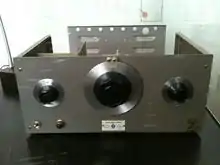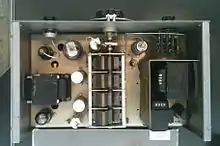HP200A
The HP200A was the first product made by Hewlett-Packard and was manufactured in David Packard's garage in Palo Alto, California.


It was a low-distortion audio oscillator used for testing sound equipment. It used the Wien bridge oscillator circuit, that had been the subject of Bill Hewlett's Masters thesis. It was also the first such commercial oscillator to use a simple light bulb as the temperature-dependent resistor in its feedback network.[1] The light bulb was an inexpensive and effective automatic gain control that not only kept the oscillator output amplitude constant, but it also kept the oscillator's loop gain near unity. The latter is a key technique for achieving a low distortion oscillator. Earlier, Larned Meacham had used light bulbs in bridge circuits to stabilize and linearize oscillators in 1938.[2]
The product code was chosen to give the impression that HP was an established company.[3] Walt Disney bought eight of them for use in the production of Fantasia.[1]
The circuit diagram is shown in Hewlett's 1939 patent.[4][5][6]
| HP200A | HP200B | |
|---|---|---|
| Frequency range | 35 Hz-35 kHz in 3 range X1: 35-350 Hz X10: 350-3500 Hz X100: 3500- 35 000 Hz | 20 Hz-20 kHz in 3 range X1: 20-200 Hz X10: 200-2000 Hz X100: 2000- 20 000 Hz |
| Scale of dialer | 35-350 | 20-200 |
| Calibration accuracy | less than 2% | less than 2% |
| Output power | 1 W 500 Ω load | 1 W 500 Ω load |
| Distortion | less than 1% between 35 Hz and 15 kHz | less than 1% between 35 Hz and 15 kHz |
| Output impedance | less than 75Ω under 15 kHz | less than 75Ω under 15 kHz |
| Power voltage | 115 V 50-60 Hz 60 W | 115 V 50-60 Hz 60 W |
Development
Through the 1940s and into the 1950s, the subsequent versions of the 200A covered different and wider frequency ranges. The latest version was the 200CD; it covered from the subaudio 5 Hz to the low end of the AM radio band at 600 kilohertz. The 200CD became a ubiquitous audio generator in engineering laboratories worldwide from the 1950s to the 1990s.[8][9]
References
- Gordon Laing (2004), Digital retro, The Ilex Press Ltd, ISBN 9781904705390
- Meacham, L. A. (October 1938), "The Bridge Stabilized Oscillator" (PDF), Bell System Technical Journal, 17 (4): 574–591, doi:10.1002/j.1538-7305.1938.tb00799.x. Frequency and amplitude stabilization of an oscillator with no tube overloading. Uses tungsten lamp to balance bridge.
- Pasiuk, Laurie (2006). Vault guide to the top tech employers. Vault Inc. p. 111. ISBN 978-1-58131-339-0. Retrieved 2010-05-10.
- US 2268872, Hewlett, William R., "Variable Frequency Oscillation Generator", published 11 July 1939, issued 6 January 1942
- "Variable Frequency Oscillation Generator, US patent 2,268,872" (PDF).
- "Model 200A audio oscillator, 1939".
- user manual 1951
- Hewlett-Packard HP-200CD audio generator
- Dating Vintage HP Instruments